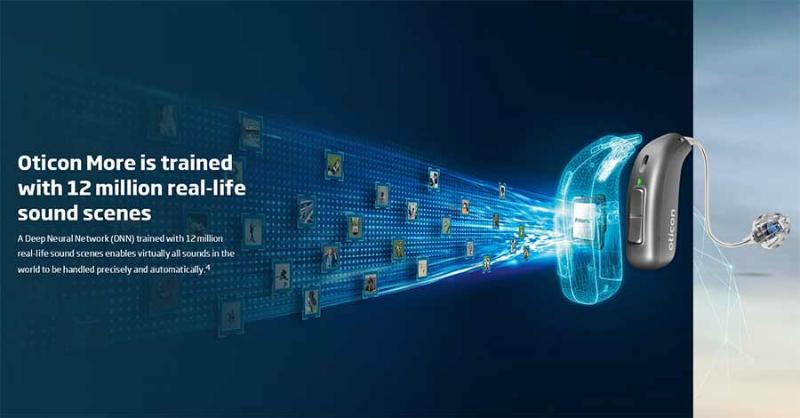This article is a guest article by George Newton, who is a writer and editor at Write my research paper and Dissertation writing service. He has an interest in AI and in particular, how it may affect hearing aids. It is something of great interest to me as it has become a buzz expression in the hearing aid world. Anyway, without further pre-amble, here is the article.

Brief Overview On AI Hearing Aids
Hearing aids help people hear better. In fact, hearing aids have evolved to be multifunctional over the years. With the state-of-the-art technology combining acoustic with biometric sensors that can process signals, today’s hearing aids can now do the following for hearing aid users:
- Automatically detect whenever the patient falls
- Improve speech intelligibility in both quiet and noisy settings
- Monitor physical activity of the patient
- Monitor social engagement, AND
- Serve as a virtual assistant
Diving Deeper
When one thinks of artificial intelligence, the first thing that might come to mind is science fiction. But nowadays, artificial intelligence has gone beyond the imaginings that make the most popular science fiction media crystallized in the minds of sci-fi fanatics.
Artificial intelligence (AI) implies that a machine can mimic human intelligence by performing tasks based on predetermined rules. As such, other phenomena fall under AI:
- Deep learning
- Machine learning
- Neural network, etc.
But where do hearing aids get involved?
“The idea of artificial intelligence has evolved over the recent years,” says Carter Gomez, a business blogger at Write my X and 1 Day 2 write. “Now, AI is seeping into devices like hearing aids. If AI hasn’t been implemented already, it’s at least being talked about by medical professionals and tech experts alike.”
DNN
To be more specific, hearing aids may benefit from the use of the deep neural network (DNN) – a form of AI. DNN involves mimicking the neural habits of the brain, in the hopes of responding the same way that the brain would without reacting to a given situation explicitly.
As mentioned earlier, hearing aids have evolved over the years. In fact, they have now gone from simplistic to more tech-based, thanks to advancements in technology like AI. Along with technology known as wide dynamic range compression (WDRC), hearing devices can now make some decisions based on what they hear. In hindsight, a DNN can have your hearing aids mimic how your brain would hear sound if you didn’t have hearing issues.
In order for hearing aids to work effectively with DNN, they need to adapt to someone’s individual hearing needs, along with various background noise environments that he or she might be in.
Is AI Necessary?
“The use of AI in hearing aids depends on the user,” says Dennis Evergreen, a technical writer at Origin Writings and Brit Student. “Some people will be willing to take advantage of the features brought on by AI, while others won’t feel like they need it to hear better. Ideally, people who are always out and about may need to take advantage of AI in hearing aids, because it enhances the hearing experience. On the other hand, patients who either stay at home a lot or live on their own might not need this added hearing benefit after all.”
Let’s dive deeper…
Suppose you’re an everyday commuter. You’ll most likely travel from home to work (or school). You’ll most likely be subject to the following sounds:
- Cars (and other vehicles) zooming by
- Passersby
- People talking to you
- Construction sites
- Auditory traffic signals, etc.
In that case, AI-enabled hearing aids can be useful in this scenario.
Or, suppose you’re home-bound. You might not be subject to as many sounds as you would when you’re out and about. Therefore, AI-enabled hearing aids might not be for you. In short, whether you plan on using AI-enabled hearing aids is up to you.
Conclusion
Ultimately, AI still has a long way to go before being 100% implemented in devices such as hearing aids. While AI-enabled hearing aids might not promise perfect results and better hearing, researchers are already working to get to that desired goal of making hearing aids life-enhancing with artificial intelligence.
When hearing is improved, hearing users are able to interact better with the world, as well as the people around them. However, technologies like AI must be able to work with the brain to make hearing aids work to the users’ advantage. This is not to say that AI can replace the human brain; it’s to improve the human experience.
 George J. Newton is a writer and editor at Write my research paper and Dissertation writing service. He is also a contributing writer for Next Coursework. As a business development manager, he has overseen many business operations in various companies in his hometown in Seattle.
George J. Newton is a writer and editor at Write my research paper and Dissertation writing service. He is also a contributing writer for Next Coursework. As a business development manager, he has overseen many business operations in various companies in his hometown in Seattle.










